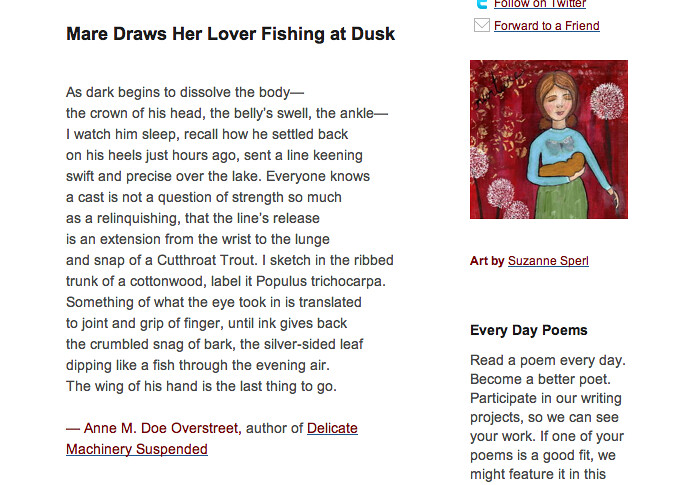This morning, Megan Willome wrote to me about today’s Every Day Poems selection.
“An ode to fly fishing, perhaps?” she asked, and finished by saying she knew there was more to the poem but these were the lines that drew her.
I have been thinking about this all morning. I began by writing back to Megan, to say that somehow I had focused on the fishing when I first read the poem, but today, receiving it in my inbox, I had seen the sleep instead. I also said that I was compelled by “the thought that maybe it was Mare who was fishing, or the poet herself.”
This did not come on the first reading, or the second, or the third… and so on. I think I must have read the poem ten times before saying this to Megan.
Now, writing this, I am struck by the word “lines” in the poem and in fact am more convinced than ever that the piece is about poets as much as it is about Mare’s lover.
Or maybe the poem is about the reader. After all, who does the poet catch with her line, but you and me, while we are unsuspecting? And who does the poet draw, but us, sleeping? When we finally wake, we become the trout, caught and compelled.
Megan wrote back to me and said, “A good poem does that—offers multiple gifts upon multiple readings.” Yes.
Poem by Anne M. Doe Overstreet. From her new collection, Delicate Machinery Suspended.
- Poetry Prompt: In the Wild Secret Place - January 6, 2025
- Journeys: What We Hold in Common - November 4, 2024
- Poetry Prompt: My Poem is an Oasis - August 26, 2024

Maureen Doallas says
This is something I really enjoy: seeing how different readers regard a poem, what each brings to his or her own interpretation.
One of the great things about Anne’s collection is how it pulls you to read more than once and always gives up something new.
When I re-read the poem now, for example, I think of it as the poet Anne commenting on her husband Jeffrey’s writing. Those words about lines and cast make me think of theatre and performance (on stage, in film) and disguise, which also plays into this sense:
There’s what’s on top – the words as you first come to them – and then there’s what’s below, which is the words constantly revealing, yielding.
Wish I’d thought of this when I was writing the review. It’s a whole ‘nother way of looking at these wonderful poems.
L. L. Barkat says
There’s the water, yes. There’s the reflection. The fish are below, sometimes. And sometimes they rise up into the air, silver and dazzling…
Marcus Goodyear says
I suppose I’m very literal about these things. I tend to take a formalist approach to poems on the first read, looking for the subject and story and characters first, then theme and technique later.
This one is about art for me. The speaker is drawing a picture of her lover who has fallen asleep while fishing. As the evening gets darker, she remembers the day in her drawing, turning what she sees into something that comes out of the ink on paper through her hand.
In some ways, I see this as an Ekphrasis poem. I like how Maureen tied it to Jeffrey’s work, assuming the speaker is Anne herself.
John says
I hear an ode to dusk – that time of relinquishing, those moments of drawing in all the lines that have been cast during the day, a memory reel if you will…and the texture of flesh and bone resisting dissolving to the very end.
Beautiful poem and this exercise a variant of lectio (in my opinion)…thanks!
L. L. Barkat says
I think a good poem must allow itself to be enjoyed first at the literal level. Otherwise it’s too off-putting. Too “look at how clever I am.”
My guess is that the deeper things that come in a poem like this one from Anne, come almost by accident, as she begins to write from the literal. And maybe that’s how it works for the reader too? We begin finding things after we start from a definite, rooted “place” that the poem creates for us?
Somehow this reminds me of the Narnia chronicles. First we enjoy them purely as very good stories. Later we might notice, oh… the stories can mean something beyond.
Violet says
What I’m thinking as I re-read the poem and your comments, is how as poets, when we give our poems to the world we also give up a measure of control. We are releasing our words to be what it will to the reader. Too much poet explanation can get in the way of this while the right amount of ambivalence gives readers the opportunity to see and interpret through the lenses of their own lives.
Claire says
To me the poem was about death. The word that spoke most strongly was ‘relinquishing’ and how it tied in with her sketching a plant: a dissection of life if you will.
I am in agreement with others though… there is the literal and then as Violet says, there is the personalisation.
I see him fishing, her sketching by the lake and completing the drawing as he rests close by.
L. L. Barkat says
Violet, we sure do! I think of Claire’s comment that follows yours, and this seems truer than ever.
Wow, Claire, I never would have conceived of it this way. But of course it is a whole alternate way of seeing it. Amazing 🙂